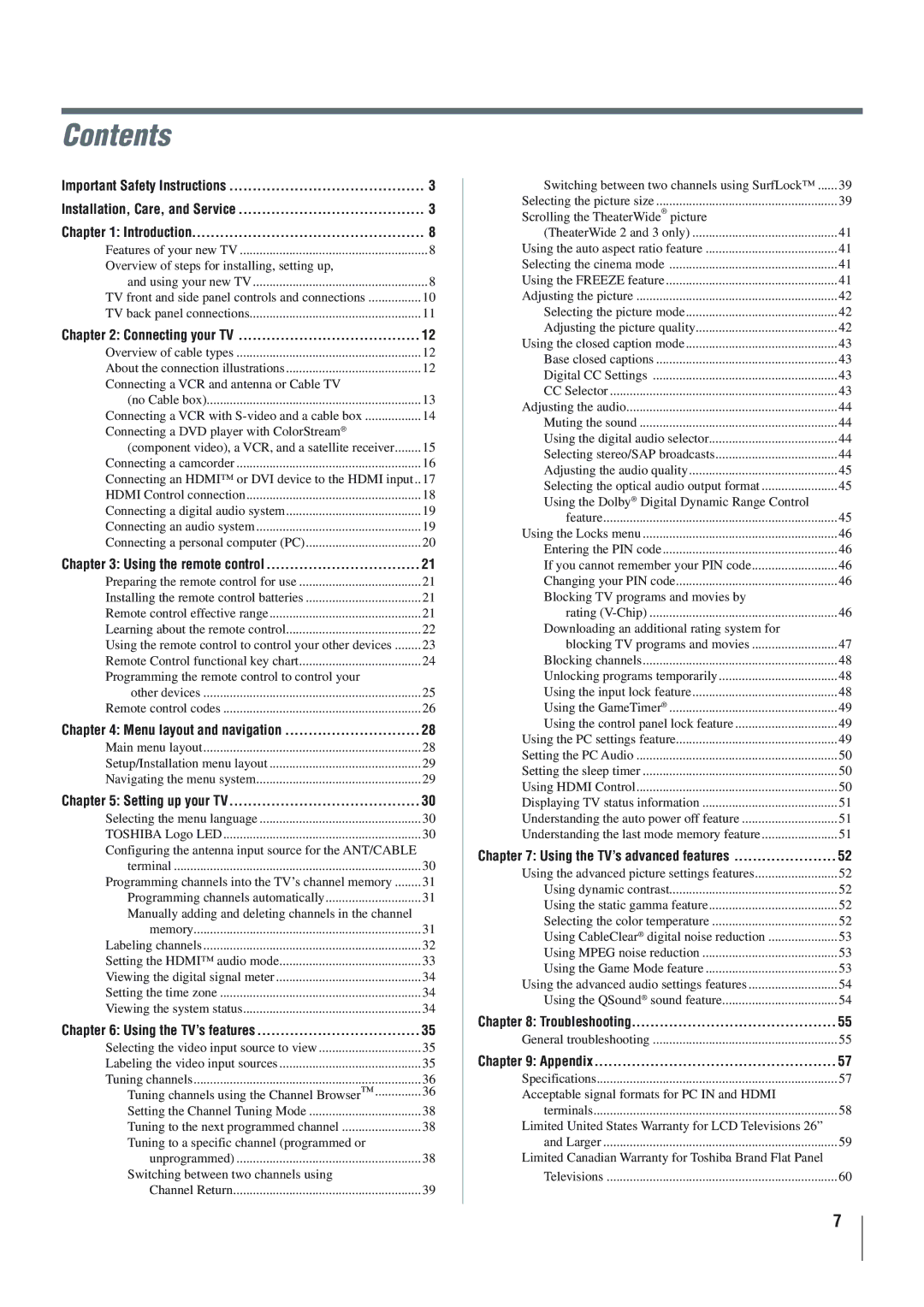
Contents |
|
Important Safety Instructions | 3 |
Installation, Care, and Service | 3 |
Chapter 1: Introduction | 8 |
Features of your new TV | 8 |
Overview of steps for installing, setting up, |
|
and using your new TV | 8 |
TV front and side panel controls and connections | 10 |
TV back panel connections | 11 |
Chapter 2: Connecting your TV | 12 |
Overview of cable types | 12 |
About the connection illustrations | 12 |
Connecting a VCR and antenna or Cable TV |
|
(no Cable box) | 13 |
Connecting a VCR with | 14 |
Connecting a DVD player with ColorStream® |
|
(component video), a VCR, and a satellite receiver | 15 |
Connecting a camcorder | 16 |
Connecting an HDMI™ or DVI device to the HDMI input.. | 17 |
HDMI Control connection | 18 |
Connecting a digital audio system | 19 |
Connecting an audio system | 19 |
Connecting a personal computer (PC) | 20 |
Chapter 3: Using the remote control | 21 |
Preparing the remote control for use | 21 |
Installing the remote control batteries | 21 |
Remote control effective range | 21 |
Learning about the remote control | 22 |
Using the remote control to control your other devices | 23 |
Remote Control functional key chart | 24 |
Programming the remote control to control your |
|
other devices | 25 |
Remote control codes | 26 |
Chapter 4: Menu layout and navigation | 28 |
Main menu layout | 28 |
Setup/Installation menu layout | 29 |
Navigating the menu system | 29 |
Chapter 5: Setting up your TV | 30 |
Selecting the menu language | 30 |
TOSHIBA Logo LED | 30 |
Configuring the antenna input source for the ANT/CABLE |
|
terminal | 30 |
Programming channels into the TV’s channel memory | 31 |
Programming channels automatically | 31 |
Manually adding and deleting channels in the channel |
|
memory | 31 |
Labeling channels | 32 |
Setting the HDMI™ audio mode | 33 |
Viewing the digital signal meter | 34 |
Setting the time zone | 34 |
Viewing the system status | 34 |
Chapter 6: Using the TV’s features | 35 |
Selecting the video input source to view | 35 |
Labeling the video input sources | 35 |
Tuning channels | 36 |
Tuning channels using the Channel Browser™ | 36 |
Setting the Channel Tuning Mode | 38 |
Tuning to the next programmed channel | 38 |
Tuning to a specific channel (programmed or |
|
unprogrammed) | 38 |
Switching between two channels using |
|
Channel Return | 39 |
Switching between two channels using SurfLock™ | 39 |
Selecting the picture size | 39 |
Scrolling the TheaterWide® picture |
|
(TheaterWide 2 and 3 only) | 41 |
Using the auto aspect ratio feature | 41 |
Selecting the cinema mode | 41 |
Using the FREEZE feature | 41 |
Adjusting the picture | 42 |
Selecting the picture mode | 42 |
Adjusting the picture quality | 42 |
Using the closed caption mode | 43 |
Base closed captions | 43 |
Digital CC Settings | 43 |
CC Selector | 43 |
Adjusting the audio | 44 |
Muting the sound | 44 |
Using the digital audio selector | 44 |
Selecting stereo/SAP broadcasts | 44 |
Adjusting the audio quality | 45 |
Selecting the optical audio output format | 45 |
Using the Dolby® Digital Dynamic Range Control |
|
feature | 45 |
Using the Locks menu | 46 |
Entering the PIN code | 46 |
If you cannot remember your PIN code | 46 |
Changing your PIN code | 46 |
Blocking TV programs and movies by |
|
rating | 46 |
Downloading an additional rating system for |
|
blocking TV programs and movies | 47 |
Blocking channels | 48 |
Unlocking programs temporarily | 48 |
Using the input lock feature | 48 |
Using the GameTimer® | 49 |
Using the control panel lock feature | 49 |
Using the PC settings feature | 49 |
Setting the PC Audio | 50 |
Setting the sleep timer | 50 |
Using HDMI Control | 50 |
Displaying TV status information | 51 |
Understanding the auto power off feature | 51 |
Understanding the last mode memory feature | 51 |
Chapter 7: Using the TV’s advanced features | 52 |
Using the advanced picture settings features | 52 |
Using dynamic contrast | 52 |
Using the static gamma feature | 52 |
Selecting the color temperature | 52 |
Using CableClear® digital noise reduction | 53 |
Using MPEG noise reduction | 53 |
Using the Game Mode feature | 53 |
Using the advanced audio settings features | 54 |
Using the QSound® sound feature | 54 |
Chapter 8: Troubleshooting | 55 |
General troubleshooting | 55 |
Chapter 9: Appendix | 57 |
Specifications | 57 |
Acceptable signal formats for PC IN and HDMI |
|
terminals | 58 |
Limited United States Warranty for LCD Televisions 26” |
|
and Larger | 59 |
Limited Canadian Warranty for Toshiba Brand Flat Panel |
|
Televisions | 60 |
7
